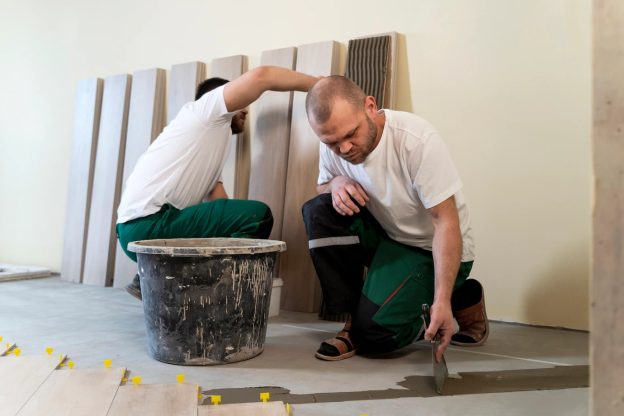Rainy weather can present unique challenges for the flooring in your home or commercial space. Excess moisture can lead to slippery surfaces, mold growth, and damage to traditional flooring materials. To ensure your floors can withstand rainy conditions while keeping your interior safe and stylish, it’s essential to choose the right flooring material. Let’s explore five types of flooring that excel in rainy weather, providing both durability and aesthetic appeal.
1. Porcelain Tile
Porcelain tile is a fantastic choice for areas exposed to moisture and rain, such as entryways, bathrooms, and kitchens. It offers excellent resistance to water and moisture damage. Porcelain tiles are known for their durability and are resistant to scratches and stains. They come in various styles, including options that mimic the look of wood or stone. Additionally, porcelain tiles often have textured surfaces, providing slip resistance, which is especially important in rainy conditions.
2. Luxury Vinyl Flooring
Luxury vinyl flooring has become increasingly popular due to its versatility and ability to withstand wet conditions. It’s waterproof and can handle exposure to rain without warping or damage. Luxury vinyl comes in a wide range of designs, including realistic wood and stone looks. It’s also comfortable underfoot and easy to maintain, making it a practical choice for rainy weather areas like mudrooms, basements, and even living spaces.
3. Natural Stone Flooring
Natural stone, such as granite or slate, is a durable and moisture-resistant flooring option. These stones are naturally slip-resistant due to their textured surfaces. They add a touch of elegance and timeless beauty to any space. While they may require more maintenance and sealing compared to other flooring materials, their longevity and ability to withstand rainy weather make them a valuable choice for entryways and outdoor areas.
4. Rubber Flooring
Rubber flooring is well-known for its durability, slip resistance, and moisture resistance. It’s an excellent choice for areas prone to wetness, including commercial spaces, gyms, and kitchens. Rubber flooring is comfortable to walk on, making it also suitable for residential spaces. It’s available in various colors and designs, allowing you to create a visually appealing and safe environment even in rainy weather.
5. Engineered Hardwood Flooring
While solid hardwood may not be the best choice for rainy environments due to its susceptibility to moisture damage, engineered hardwood offers a solution. Engineered hardwood consists of layers of wood with a top layer of real hardwood. This construction makes it more resistant to moisture-related issues. With proper sealing and maintenance, engineered hardwood can bring the warmth and beauty of wood to your interior spaces without the concerns associated with rainy weather.
Conclusion
Choosing the right flooring for rainy weather conditions is essential to maintain your space’s safety, style, and longevity. Each of these flooring options offers unique advantages, from the moisture resistance of porcelain tile and luxury vinyl to the natural beauty of stone and the durability of rubber and engineered hardwood. Evaluate your specific needs for residential or commercial spaces and select the flooring material that best fits your rainy weather requirements. With the right choice, you can enjoy a beautiful and functional space even during wet conditions, knowing your floors are up to the challenge.
